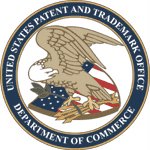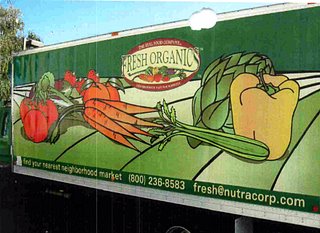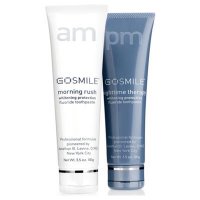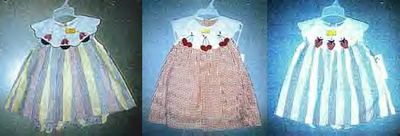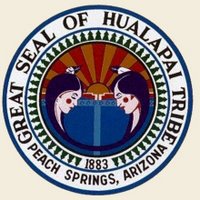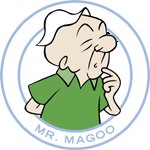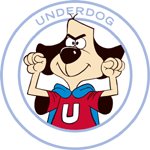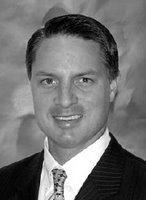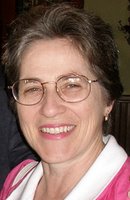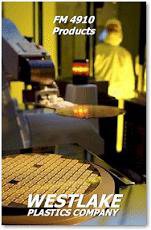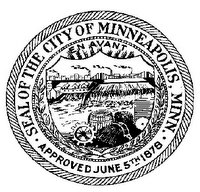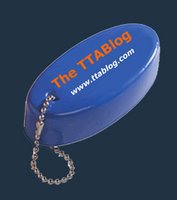TTABlog Quarterly Index: January - March 2006
It's been quite a quarter! Eighteen citable decisions (as of March 24th), equalling the total for all of last year. Proposed TTAB Rule changes and lots of comments thereon. The continuing Leo Stoller saga. The launching of the new Shape Blog. Can the next quarter even come close in bloggable excitement? Maybe. Let's see, there's the INTA annual meeting in Toronto, the second annual "Meet the Bloggers" event, the World Cup, more scintillating TTAB decisions, perhaps a few more Stoller extension requests, the continuing battle over the TTAB Rule changes, .... Somehow, I think the TTABlog will not be scrounging around for content.
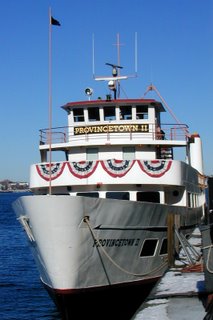
Section 2(a) - immoral or scandalous:
Section 2(d) - likelihood of confusion:
- TTAB Finds "IMMUNO-RX" and "IMMUNEX" Confusingly Similar for Pharma/Nutra-ceuticals
- TTAB Affirms 2(d) Refusal of "TOP DOG & Design" for Food Concession Services
- "GREEN by Missako" for Clothing Confusingly Similar to "GREEN" for Footwear, Says TTAB
- "SPYRO" (the Dragon) Blocked by Broad "Computer Software" Registration in TTAB 2(d) Affirmance
- TTAB Says No-No: "YAYA" 2(d) Opposer Failed to Make Prima Facie Case
- TTAB Finds "OXYGROW" and "AUXIGRO" Confusingly Similar for Fertilizer
- TTAB Sustains "TUMS" Section 2(d) Opposition to "MR. TUMEE"
- TTAB Citable No. 9: "LESSBUCKS COFFEE" Confusingly Similar to Famous "STARBUCKS" Mark
- "COLD DOG" Mark Gets Cold Shoulder in TTAB 2(d) Appeal
- "GENTLE LIPS" and "GENTLE GEL" Confusingly Similar for Lip Balm, Says TTAB, Unconvincingly
- "CHICKS RULE" Double Entendre Argument Lays Egg at TTAB
- Sophistication of Purchasers Key to TTAB Reversal of "ME-KEY" 2(d) Refusal
- "WILD GEESE" Runs Afowl of Famous "WILD TURKEY" Mark in TTAB 2(d) Opposition
- In Citable No. 5, TTAB Grants Summary Judgment in 2(d) "WIRETRACKS" Cancellation
- "ISHINE" and "ICE SHINE" Sound Confusingly Similar, TTAB Says (Citably)
- TTAB Unconvincingly Finds "GOSMILE PM" and "P.M." Confusingly Similar for Toothpaste
- "PURPOSE" and "DUAL-PURPOSE MASSAGE CREME" Confusingly Similar, Says TTAB
- TTAB Finds "BOSS AUDIO" and "AUDIO BSS" Logos Confusingly Similar in a Citable Decision
- In a Citable Decision, TTAB Cancels Three "TUNDRA" Registrations on the Ground of Fraud
- TTAB Finds "KEEP RUNNING" and "KEEP WALKING" Confusingly Similar for Footwear
- TTAB Again Reverses 2(d) Refusal Based on Unimpressive Third-Party Registration Evidence
- Belated Amendment of I.D. Overcomes "GRAVITY" in TTAB 2(d) Appeal
Section 2(e)(1) - mere descriptiveness:
- "SATURDAY MORNING T.V." Merely Descriptive of TV Programs, Says TTAB in Citable No. 17
- TTAB Citable No. 16: "SMARTSFP" Merely Descriptive of Optical Transceivers
- TTAB Citable No. 15: "FM4910" Merely Descriptive of Flame Retardant Plastic
- THE BREATHABLE MATTRESS" Merely Descriptive of Mattresses, Says TTAB, Citably
- Citable No. 12: TTAB Throws Wet 2(e)(1) Blanket on "PARTY AT A DISCOUNT!" Application
- Ill Wind Blows for "ERGONOMIC" Ceiling Fan Applicant: TTAB Citably Affirms Mere Descriptiveness Refusal
- "FREEDOM FRIES" Not Merely Descriptive of French Fries, Says TTAB (Citably)
- TTAB Shocker: "SUPER" Not Merely Descriptive of Vehicle Lights
- TTAB Finds "MERCHANDISER" Descriptive of a Newspaper, Affirms Disclaimer Requirement

Section 2(e)(4) - primarily merely a surname:
- Citable No. 13: TTAB Affirms Surname Refusal of "GIGER MD" for Exercise Machines
- TTAB Says "VAULTZ" for Purses Not Primarily Merely a Surname
Fraud:
- In Citable No. 18, TTAB Draws Distinction between Fraud and Nonuse
- In a Citable Decision, TTAB Cancels Three "TUNDRA" Registrations on the Ground of Fraud
Genericness:
- TTAB Applies Wrong Test in Affirming "FRESH ORGANICS" Genericness Refusal
- TTAB Says "BYK-RAK" Generic for Bus Bike Racks
- In a Citable Decision, TTAB Reverses Genericness Refusal of AOL's "INSTANT MESSENGER"
- TTAB Finds "DIABETES RISK TEST" Generic for ... Guess What?
Not a Trademark/Mutilation:
Trade Dress/Product Configuration:
Use in Commerce/Specimen of Use:
Practice and Procedure:
- "GOSMILE PM" Applicant Seeks District Court Review of TTAB 2(d) Affirmance
- In Citable No. 18, TTAB Draws Distinction between Fraud and Nonuse
- TTAB Citable No. 8: Laches Grounds "GOLD SEAL" 2(d) Cancellation Petition
- Citable No. 7: Canadian Bests Dane in Use-less TTAB Priority Duel
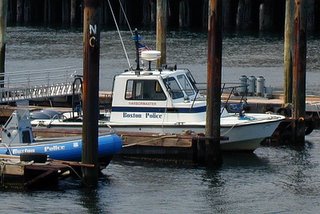
Proposed TTAB Rule Changes:
- PTO Reopens Comment Period Re Proposed TTAB Rule Changes
- ABA-IPL and Others Submit Comments on Proposed TTAB Rule Changes
- INTA and Oblon, Spivak Submit Comments on Proposed TTAB Rule Changes
- AIPLA Submits Comments on Proposed TTAB Rule Changes
- More Comments Submitted on Proposed TTAB Rule Changes
- Merchant & Gould Offers "Proposed Changes to TTAB Rules Webinar Presentation"
- Leo Stoller Submits Comments on Proposed TTAB Rule Changes
- TTABlog Hears Growing Groundswell of Non-Support for Proposed TTAB Rule Changes
- Merchant & Gould To Hold "Power Breakfast" on Proposed TTAB Rule Changes
- Proposed TTAB Rules Require Initial Disclosure, Discovery Conference
CAFC Decisions:
- CAFC Affirms TTAB's Slokevage Product Design Trade Dress Ruling
- Leo Stoller Loses CAFC Appeal From TTAB Dismissal Sanction
- CAFC Ruling Deals Another Blow to Enforcement of Design Patents
Leo Stoller:
- Leo Stoller Responds to March 27th TTABlog Report
- TTABlog Report: Leo Stoller Marches On
- Leo Stoller Submits Comments on Proposed TTAB Rule Changes
- Leo Stoller TTAB Extension Requests Top 550 in Last Three Months
- TTABlog Update on Leo Stoller and Companies
- Leo Stoller files 75 Extension Requests at the TTAB in First 5 Days of 2006
- Leo Stoller Loses CAFC Appeal From TTAB Dismissal Sanction
- TTABlog Report: Leo Stoller's Year 2005 in Review
Other:
- Shape Blog Follows Lawman Design Patent Case
- TTABlog Flotsam and Jetsam: Issue No. 9
- New "Shape Blog" Focuses on IP Protection of Product Design
- USPTO Issues Another Notice Regarding Its Failure to Notify WIPO in 42 More Section 66(a) Applications
- The Top Ten TTAB Decisions of 2005®
- CAFC Ruling Deals Another Blow to Enforcement of Design Patents
- California Man Opposes "DYKES ON BIKES" Service Mark Application
- TTAB Suspends "THE LAST BEST PLACE" Oppositions
- TTABlog Says: It's Time to Tackle the "Trademark Trolls"
- Recommended Reading: Best Practices for Registering Product Configuration Trade Dress
- The Ten Worst TTAB Decisions of 2005?
- What is the TTAB Affirmance Rate for Ex Parte Refusals? The TTABlog Reports
- TTAB Citable Decisions for 2005 Total 18
Text and Photographs © John L. Welch 2005-2006.

